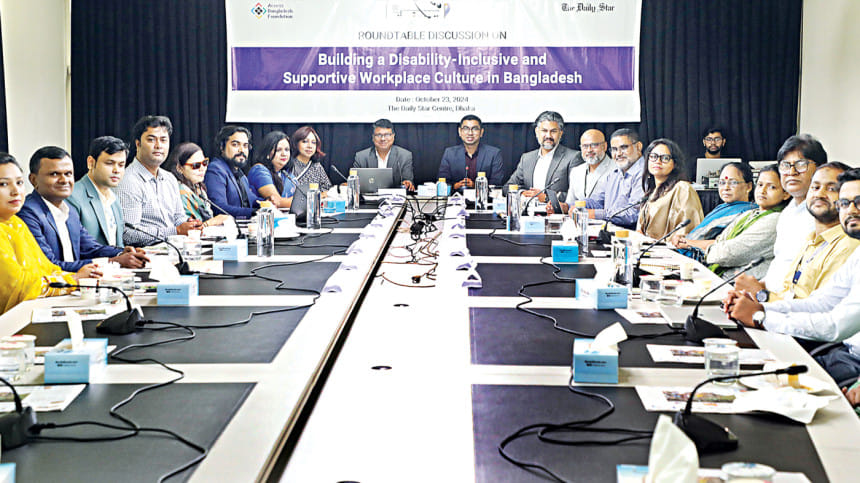Policy solutions key to their inclusion in job sector

Hawa Islam, a graduate with hearing and speech disabilities, endured discrimination and disrespect while working in several job sectors in Bangladesh. Eventually, she ended up without a job and is currently struggling financially.
"I have worked hard to develop my skills to earn a living, but my disabilities became major obstacles. Employers don't assess my abilities; instead, they exclude me as soon as they learn about my situation. I've applied for 25 jobs but haven't received a single call for an interview," said Hawa.
The remarks came during an event titled "Building a Disability-Inclusive and Supportive Workplace Culture in Bangladesh," jointly organised by The Daily Star and Access Bangladesh Foundation at The Daily Star Centre yesterday.
Keeping their limitations in mind, a suitable workplace and work environment must be created for them in the government and private sector by including it in the policy.
Another speaker, Akash Rahman, who has cerebral palsy, recounted the struggles he faced before securing a job and having his own family.
Nazmus Sakib, diversity and inclusion officer of UNDP, said, "Barriers are created by the system, which results in the skills of people with disabilities not being expressed. Time and opportunity are not given to them while answering questions during vivas. In this way, their talent is disregarded."
"Disability is not a homogeneous group. They have the capacity and skills to go into employment, but our social conditions and ecosystem do not support it," he added.
Nazma Ara Begum Poppy, national project support officer at UN Women Bangladesh, said no separate studies are done to assess the barriers women with disabilities face, so there are no solutions.
These women are also more likely to be sexually harassed at work, she added.
"Our roads are not disability-friendly. We require help from other people to move around. The existing disability act does not mention any special facilities for women either," she said.
Both Nazmus and Nazma are persons with visual disabilities.
Mahmudul Hasan, assistant director of Society for the Welfare of the Intellectually Disabled, Bangladesh, said, "To increase their [people with intellectual disabilities] self-reliance and rehabilitation, they should be given the opportunity to do the work they are good at by evaluating their mental capacity."
"People with mild intellectual disabilities can be made skilled and accommodated in the workforce with proper vocational training. So, keeping their limitations in mind, a suitable workplace and work environment must be created for them in the government and private sectors by including it in the policy," he suggested.
According to statistics presented during the event, the unemployment rate for persons with disabilities was reported at 66 percent in 2021 and nearly 73 percent in 2022, as per the data from a Labour Force survey and the National Survey on Persons with Disabilities.
Prof Dr Mohammad Sohrab Hossain, executive director of Centre for the Rehabilitation of the Paralysed, said, "Policy and law regarding this issue must be implemented properly. Disability is a diverse group. According to their needs, accessibility in the workplace and other necessary items such as desks and laptops should be modified and made suitable for them."
"A support system should be developed for those facing disabilities as a result of the recent mass uprising," he added.
Md Mashequr Rahman Khan, president of Bangladesh Society for Human Resources Management, suggested increasing the budget allocation for persons with disabilities and encouraging entrepreneurship.
Murteza Rafi Khan, chief executive officer of Bangladesh Business and Disability Network, said there are employers now who are positive about the issue.
But there is a long way to go, and a collaborative approach with every stakeholder is needed, he added.

 For all latest news, follow The Daily Star's Google News channel.
For all latest news, follow The Daily Star's Google News channel. 



Comments